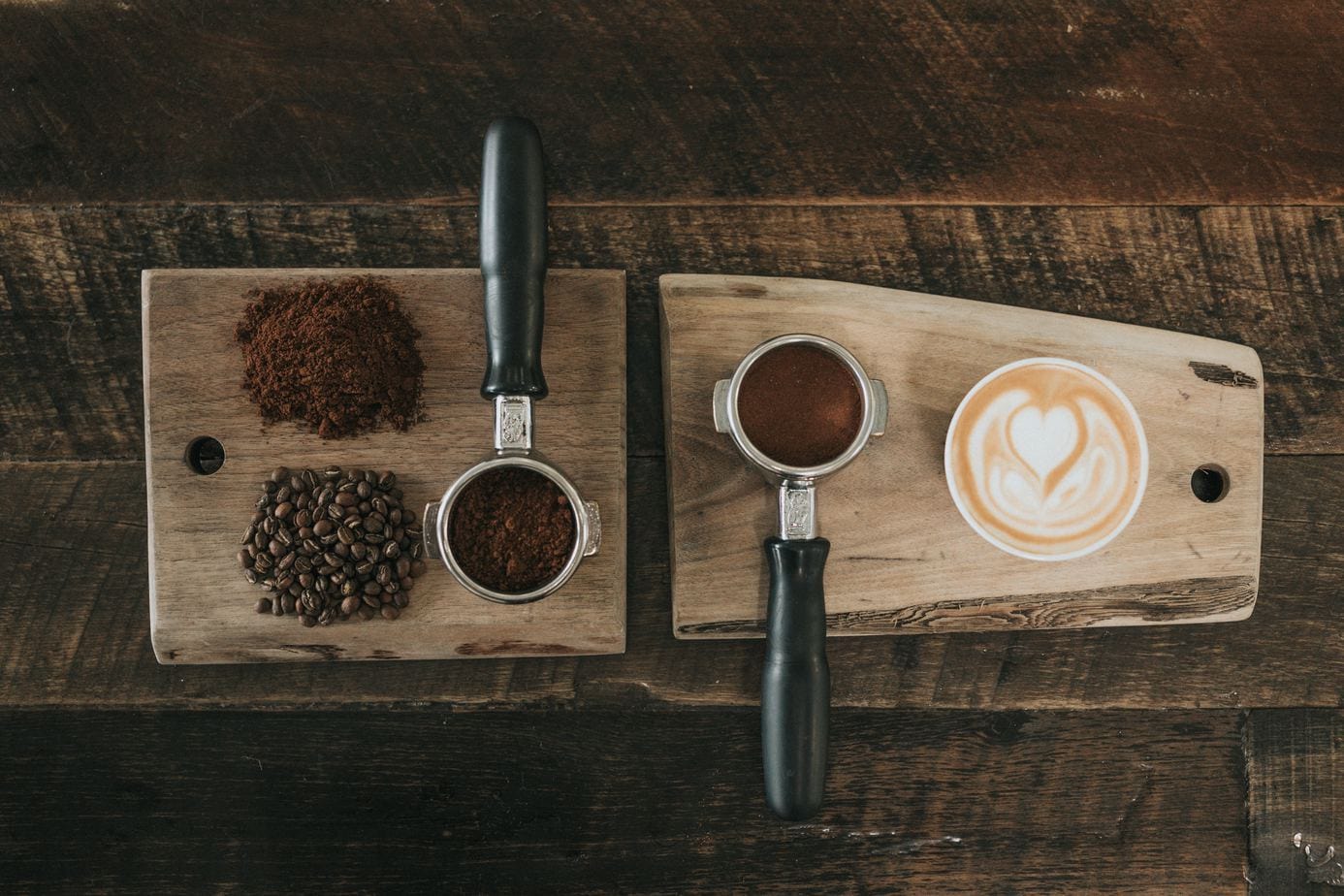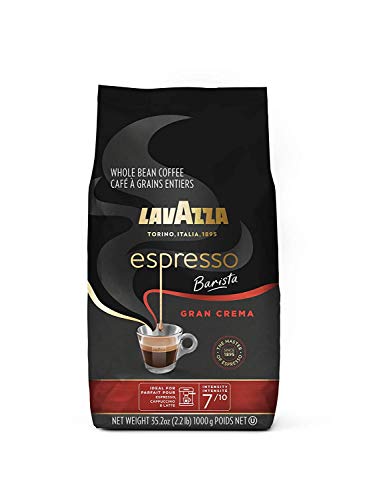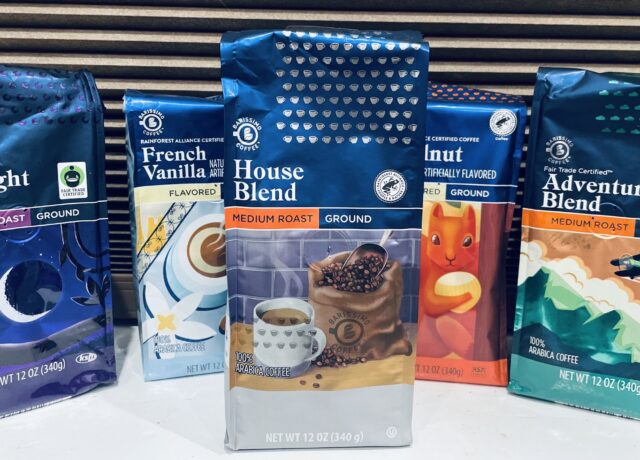Most coffee fans will have heard of two Italian brands; Illy and Lavazza.
At first glance, you might think that these two coffees are much the same, but wait! There are subtle (and not so subtle) differences that you should be aware of before you buy.
Illy Overview
Illy was founded in 1933 in Italy by Francesco Illy. This intrinsically Italian coffee roasting company specializes in the production of espresso.
The company produces its signature, superior-quality blend of coffee in three different roasts; regular, dark roast, and decaf. Also, Illy offers single-origin Arabica beans that are sourced from six countries: Guatemala, Brazil, Colombia, Ethiopia, India, and Costa Rica.
Seasonally, Illy brings out its low-caffeine Arabica, Idillyum. Growers produce this particular blen from beans grown in the rich, volcanic soil of El Salvador.
Illy coffee is delivered as pre-ground coffee, whole beans, iperEspresso capsules, and E.S.E. espresso coffee pods. Further, Illy’s pre-ground coffee is packed in steel containers, pressurized with inert gas, rather than air, to keep the coffee fresher for longer.
Lastly, Illy’s reputation as a producer of premium coffee is largely built on their use of only 100% Arabica beans in all their products.
Lavazza Overview
Lavazza is also an Italian maker of coffee products. The company was founded in 1895 in Turin by Luigi Lavazza.
Like Illy, Lavazza uses coffee that’s imported from different sources around the world, including Costa Rica, Colombia, Brazil, Guatemala, Honduras, Indonesia, Uganda, Mexico, and the US. Although some Lavazza coffee is 100% Arabica, much of their blended coffee is a mixture of Arabica and Robusta coffees.
The company is anxious that its support of sustainable production is viewed as being high on its agenda. For this reason, they have developed The ¡Tierra! Project, an initiative that seeks to promote sustainable agriculture programs in Honduras, Peru, and Colombia. The idea is to improve coffee quality, as well as look after the environment and the working conditions for plantation workers living in those communities.
Like Illy, Lavazza offers their coffee as whole beans, pre-ground coffee, and coffee pods.
So, how do these Italian coffee giants compare?
| Illy | Lavazza | |
|---|---|---|
| Year of Origin | 1933 | 1895 |
| Specialty | Espresso | Moka Pot Blends |
| Sources | Guatemala, Brazil, Colombia, Ethiopia, India, Costa Rica | Costa Rica, Colombia, Brazil, Guatemala, Honduras, Indonesia, Uganda, Mexico, United States |
| Types of Coffee Sold | Pre-Ground, Whole Bean, iperEspresso Capsules, and ESE Pods | Pre-Ground, Whole Bean, Pods |
| Notable For | 100% Arabica Coffee | Sustainability-Focused |
Target Market
Lavazza is certainly a very well-known brand of coffee in Italy, but that seems to be mainly thanks to their pre-ground coffee that’s the buyers’ choice for use in Moka pot brewing.
Although there are a few different Moka blends to choose from, they all taste similar, thanks to the larger percentage of Robusta coffee that they contain.
On the other hand, Illy has a more significant presence in the Italian espresso market and consumers generally regard it as a producer of a more high-end product. The unique flavor of their espresso has also earned the brand some renown.
Robusta vs Arabica
As we mentioned, Illy uses 100% Arabica beans; whereas, Lavazza uses a blend of Arabica and Robusta. If you want a full breakdown of this distinction, you can read up on it here.
But here are a few key points:
- 75% of the coffee produced is of the Arabica variety and the remaining 25% is Robusta.
- The flavor of Arabica is generally preferred among coffee drinkers because they have more sugars and distinct flavor profiles, though there are exceptions.
- However, Robusta beans have more caffeine and antioxidants and is often the preference for people who like a stronger cup.
All that said, it seems that most Italians vote for Illy as their preferred brand.
But what about flavor?
Of course, the most important factor of any coffee-based drink is taste.
Illy Flavor Profile
This brand is sold at a higher price point than Lavazza, but Illy still enjoys huge popularity around the world, especially for its medium roast Moka pot ground coffee.
Illy coffee is immediately sweet and velvety on the palate with notes of fruit, toast, caramel, and chocolate. Floral accents and sweet with honey and almond comprise the fragrant aroma. Fans of Illy coffee say that the secret to their success is the consistency of flavor and quality of the brew, cup after cup.
Also, Illy sources their 100% Arabica beans from growers across four continents. Nine varieties of high-quality beans are combined and carefully balanced to produce the blend.
It’s interesting to note that coffee drinkers in the north of Italy prefer the milder, brighter flavor profile of 100% Arabica coffee beans. Whereas further south tastes lean more towards the woody, bitter mouth produced by the Robusta bean.
So, not surprisingly, Illy is more popular among northern Italians who prefer the less bitter, more subtle flavor profile.
Other popular Illy coffees include their medium and dark roast espresso ground coffee:
This Illy Classico coffee is a finely ground coffee made specifically for your espresso machine. The blend consists of 9 different Arabica coffees that are medium roasted to create a rich, balanced brew with notes of caramel and chocolate.
The Intenso dark roast coffee is another Italian espresso. It is also comprised of a 9 Arabica blend but is more robust and full-flavored compared to the mild taste of the Classico Italian coffee. The most prominent flavor note is rich, deep cocoa.
Lavazza Flavor Profile
Now, let’s take a look at the taste profile of one of Lavazza’s most popular products, Lavazza Gran Crema. Washed Arabica beans from Central America and Brazil make up 70% of this blend, while washed Robusta beans from Indonesia make up the remaining 30%.
The Arabica provides a mild acidity, balanced out by the bean’s natural sweetness. The Indonesia Robusta used is better quality than the more woody beans from Uganda and Vietnam that are traditionally used to make espresso blends, especially in Southern Italy. Washing the Robusta beans removes the bitterness and changes the taste profile to a deep, chocolatey flavor instead.
This Lavazza blend is a best-seller in the US and Europe, probably due to its versatility and natural affinity with milk-based drinks and the demographic’s general preference for a milder flavored brew.
Other popular Lavazza coffees include the Lavazza Super Crema and the Lavazza Crema e Gusto:
The Lavazza Super Crema is mild and creamy with notes of hazelnut and brown sugar. This is a whole bean blend of Arabica varieties sourced from Brazil, Colombia, and India as well as Robusta varieties from Indonesia and Vietnam. When brewed, the Lavazza Super Crema has a nice, noticeable aroma of honey, almonds, and dried fruit.
The Crema e Gusto is a dark roast coffee with a full body and rich, spiced aftertastes. The ground coffee has a creamy flavor with notes of chocolate. Illy gives the e gusto an 8/10 in terms of intensity. Crema e Gusto is a blend of Brazilian Arabicas with Robusta from Africa and Indonesia.
Other Italian Coffe Brands to Try
Contrary to what other sites may lead you to believe, Illy and Lavazza are not the only Italian coffee brands available to you. So, in case you are curious about other Italy-based brands and roasteries, we’ve collected a shortlist of a few brands and their most popular offerings.
Danesi Coffee
With over a century of industry experience under its belt, Danesi Coffee has become a leading Italian roastery with a serious cult following. Their 100% female management team is comprised of fourth-generation members of the Danesi family. The Gold blend Italian espresso linked below reigns as one of the most popular gourmet Italian coffee blends on the market.
Lollo Caffé
Looking for another Italian coffee pod option? Look no further than Lollo. The company was founded for the purpose of importing and reselling raw coffee, but today they have become one of the largest roasteries in the industry. Having anticipated the boom of single-serve coffee, this company has spent the last 10 years perfecting its technique.
Lollo Caffé now specializes in the production of coffee pods and capsules, like the ones below.
Kimbo
In Italy, Kimbo coffee rivals the popularity of Illy and currently sits in second place for the best Italian coffee on their domestic market. The brand has stood as a classic for over 50 years and is known for its high-quality traditional Neapolitan espresso. Kimbo places a strong emphasis on the importance of both embracing the rich history of Naples’ coffee history and continuing to push forward in terms of innovative production.
Caffé Musetti
This Italian coffee brand started as the passion project of Luigi Musetti, who tirelessly roasted small batches of coffee each morning to sell in his “House of Coffee.” Since then the Musetti family and their cooperators have carried on Luigi’s dream of truly high-quality artisan coffee. Caffé Musetti is now one of the Italian coffee brands with the coveted CSC (Certified Specialty Coffee) label.
Quarta Caffé
Like Caffé Musetti, Quarta Caffé got its start with just a small drum roaster, except this brand hails from Lecce in Southern Italy. It is still run by the founder’s son and two grandsons. Additionally, Quarta Caffé is well known and respected for its commitment to social programs and environmental sustainability.
Pellini
The Pellini roasting company was founded in 1922 and currently stands as a leading Italian coffee brand. The company is still run by the Pellini family, now in its third generation. The company has a number of sub-brands including Pellini, Pellini Top, and Pellini Bio.
Italian Coffee vs Italian Roast
Coffee that is blended and roasted in Italy by an Italian roastery is Italian coffee. Italian “roasts” on the other hand are coffees that are roasted to a specific darkness/oiliness level, irrespective of where that roasting takes place.
An Italian Roast is another name for the medium-dark roast level that is popular across Southern Italy. These espresso beans are roasted until they begin to develop oil but do not yet have very oily surfaces (as is common with extra dark roasts, like French roasts).
This type of roast is perfect for espresso coffee, as the longer roast allows richer flavors to develop, but the lack of oil prevents damage to grinders and the expensive espresso brewing machines. Because of this sweet spot, Italian roast coffee has become vastly popular in a number of countries.
Frequently Asked Questions
Before wrapping up, let’s see if we can tackle a few of the burning questions that come up when discussing Italian coffee.
Is Italian coffee grown in Italy?
No, at least not in any major capacity. The country may have a few overzealous coffee addicts who have chosen to grow a plant or two in their backyard. However, aside from those scattered enthusiasts, no coffee is grown in Italy.
So, while much of coffee culture as we know it originates from Italy, the beans themselves do not.
What makes Italian coffee so good?
Usually, when discussing coffee, beans are praised for the exceptional growing conditions of their origins. Certain soils, climates, and altitudes lend themselves to the cultivation of high-quality, flavorful coffee. However, there is no major coffee growth in Italy, so what makes these beans so special.
Well, it actually comes down to the companies’ ability to roast and blend their coffees. Italian coffee brands have an exceptionally rich coffee history to draw upon in their production. Thus, they have mastered the elusive art of blending the distinct, unique flavors of Arabica coffee with the punchiness of Robustas to create truly impressive blends.
Additionally, some of these roasteries have been around for over a century, so their techniques have been honed over numerous decades so that their roasting practices can make the most of those incredible blends.
Are all Italian coffees espresso roasts?
As we discussed above, there is a specific type of espresso roast called an “Italian roast.” With this naming convention comes the assumption that all Italian coffees must be Italian roasts, which, as we mentioned, is not the case. However, there still remains the question if Italian coffees are all, more broadly, espresso roasts.
The answer is technically no. You will find Italian coffees in the medium and dark roast range as well (though light roasts are uncommon). Medium-dark roasts, like the Italian roast, are often preferred for espresso coffee, but they aren’t actually a requirement.
That said, most Italian coffees, regardless of their roast, are intended to be used with an espresso machine to brew shots of espresso. This brings us to our next point…
How do Italians take their coffee?
As you may have noticed, just about every single Italian coffee is a blend of Arabica and Robusta beans. That is because, as we mentioned above, most Italian coffee is made to be brewed as espresso. The Arabica lends the brew flavor while the Robust intensifies the caffeine kick.
As a result, Italians pretty much exclusively sip espresso-based drinks. While it would take a whole article to explain the complexities of Italian coffee culture, here are a few interesting factoids:
- Many Italians enjoy coffee three times a day: morning, lunch, and afternoon break.
- Cappuccinos and lattes are exclusively breakfast and brunch beverages; drinking one after noon will definitely get you some odd looks.
- Espressos and macchiatos are appropriate for any time of day, though you are encouraged to drink coffee throughout the day rather than ordering these as double shots (doppios).
- The closest equivalent to the drip coffee you have at home is an Americano (essentially a watered-down espresso).
Wrapping it up
So, in a nutshell, coffee addicts:
- Illy is perfect for you if you like the taste of your coffee more refined and smoother and you have more flexibility in your wallet.
- Lavazza is a good option for those with a modest budget who enjoy their coffee with a little more acidity and robustness of flavor.
- If those two options start feeling a little too mainstream for you, check out one of the other Italian coffee brands we’ve covered for a more traditional Italian feel.
Of course, here at Roasty, we recommend that you check out some of the smaller, local artisan coffee manufacturers. But we won’t judge you if you prefer to take the commercial route and try out one of these brands.
Happy Caffeinating!




















